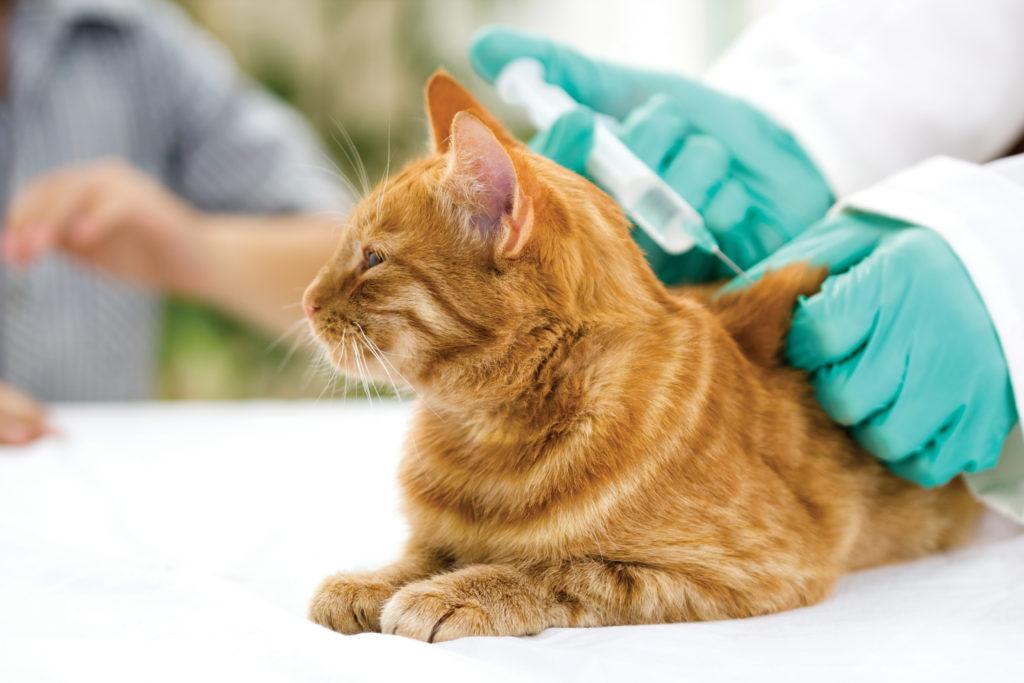Is Your Cat Up-to-Date on Vaccines?
All pet owners must know the importance of vaccines for their cat, but many end up slacking on annual appointments. Even if your cat is indoor-only, they can still fall victim to preventable disease. Cats rely on their owners to keep them safe. Be sure to get them vaccinated on the right schedule to keep them protected from illness and disease.
There are different vaccines that will help your cat at different ages. This month we’re going to provide some insight on the core vaccines, along with some that your cat may need. If you’re unsure of what vaccines your cat needs, your vet will be able to get you up to speed.
Vaccines that Your Cat Will Need Over the Years
There are a handful of core vaccines that you cat will need from the time they are kittens to adults. PetMD provides a list for pet owners to keep up with vaccines as your cat grows up. The two most important vaccines are for rabies and FVRCP. The FVRCP handles Feline Rhinotracheitis Virus/Herpesvirus 1, Feline Calicivirus, and Feline Panleukopenia, which can all be extremely infectious and can be fatal. This makes it easier for the vet to get one shot and not have to poke your cat three different times. It doesn’t matter whether or not your cat stays indoors – they need to have the proper protection to stay healthy. Veterinarians to Cats offers these vaccines, along with Feline Leukemia and Bordetella.
Even Indoor Cats Need Routine Vaccinations
As we just mentioned, all cats need to have regular vaccinations. You may think that because your cat always stays indoors that they have protection from all disease and illness. This couldn’t be further from the truth. Your pet may come into contact with outdoor animals and bacteria resulting in illness. Cats are susceptible to airborne bacteria and viruses, so those open windows and doors can bring in illness as well. With the proper vaccinations your cat will have an additional defense against this.
Keep Your Cat Safe from Rabies
The two core vaccines we mentioned are rabies and FVRCP. It’s important for cat owners to know what comes with these diseases. Rabies can both affect your pet and you, as it is fatal to humans. Any bite from an infected animal can transmit the disease to your cat. If your cat has been outside and shows signs of having been in a fight, it is important to be proactive in their care and to monitor their symptoms. Rabies has an incubation period of about two months. If your cat shows aggression or disorientation, they could have rabies. This can lead to death.
In some states, it is the law to get a rabies shot. Depending on the type of shot your veterinarian uses, it may be good for one year or three years. Be sure to check laws or speak with your vet to make sure your cat has all of the proper vaccinations.
Learn More About the FVRCP Vaccine
FVRCP, as we said above, protects against three different diseases: Feline Rhinotracheitis Virus/Herpesvirus 1 (FVR/FHV-1), Feline Calicivirus (FCV), and Feline Panleukopenia (FPV). FPV, also known as distemper, decreases the number of white blood cells.
Feline Calicivirus is a respiratory disease that can be fatal. Many cats come into contact with this while boarding or around other infected cats. Similarly, FVR also attacks the respiratory system, but is like a head cold. PetMD reminds pet owners that kittens are very prone to diseases like this. Keep an eye on any excessive sneezing, eye discharge, fever, and loss of appetite.
These diseases are easily transmissible and can quickly affect your beloved cat. If you regularly board your cat or are in contact with other cats, be sure that yours is vaccinated. This will help to keep all pets in the boarding area or home safe.
Be Aware of Potential Side Effects of Vaccines
Vaccines are safe for your cat. But like all shots, there could be side effects that show up for a few hours after the appointment. The ASPCA notes some things you may notice after the vaccines, including:
- Fatigue
- Soreness
- Vomiting
- Loss of appetite
These reactions are more common, but pay close attention. If these side effects last longer than 24 hours, be sure to call the vet right away. Effects like lameness, seizures, swelling, and difficulty breathing can be signs of an allergic reaction. Seek emergency veterinary care right away.
Visit Veterinarians to Cats for All Vaccines
When it comes time for your cat to get their vaccinations, make an appointment with Veterinarians to Cats. Your pets are your family, so be sure to keep their health on the frontline. Our vets and staff are here to provide you and your cats with the ultimate care in the Roanoke, VA, area. We are here to answer any of your questions and ensure that your cat has a clean bill of health.
Are you looking for a new veterinarian for your cats? Call Veterinarians to Cats in Roanoke, VA, at (540) 989-1400 or follow us on Facebook for updates. Talk to our veterinarians to learn more about the importance of vaccines.

